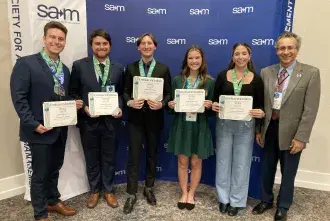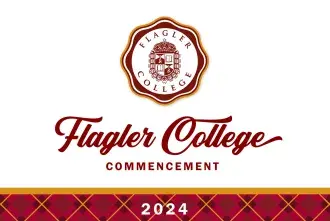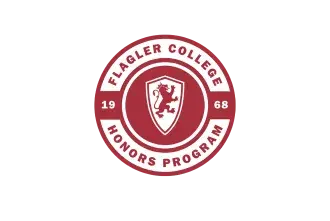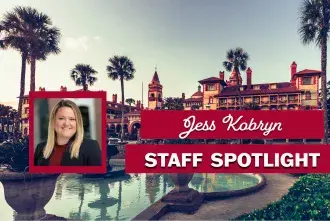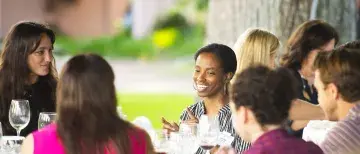
This mission reflects the College's modern vision for a classical liberal arts education, intended to inspire its students to seek what Plato called the Common Good. During the summer of 2022, Flagler received funding from the State of Florida to further its efforts in classical and liberal education.
Under this State appropriation, Flagler College also established the Institute for Classical Education to share this philosophy of education and bolster community engagement. As one of its first key initiatives, the Institute was integral in supporting the development and implementation of Flagler's New Core Curriculum.
Core, as the campus community refers to it, is a 33-credit hour re-imagined general curriculum program designed to strengthen the powers of free and independent inquiry and promote a rich sense of civic virtue.
"This core program emphasizes skills, literacies, and values that we think are fundamental in our students' success; we call them future proof," Flagler's Dean of Continuing Education, Wayne Riggs, said. "The world is changing all the time. But these skills, literacies, and values allow our students to succeed no matter where the job market goes, no matter what they're going to be doing in life."
But the momentum didn't stop with support for Flagler's new core curriculum. The Institute is also dedicated to supporting the professional development needs of educators and the academic advancement needs of schools engaged in classical education throughout Florida.
The College's first initiative towards this goal was the Institute's inaugural summer workshop: "Integrating Challenging Classical Literature throughout Curriculum," held for K-12 classical educators from June 7-9 on Flagler's campus, with an opening dinner at the St. Augustine Historical Society.
"We decided to host here at the St. Augustine Historical Society ... because we thought there was no better spot to start with a classical education workshop than at the place that preserves our history and preserves our culture right here in St. Augustine," Riggs said. "We know how important that is to classical education."
Chairman of Flagler's Board of Trustees, Ambassador John Rood, attended the dinner in fellowship with his Flagler colleagues and the educators in attendance.
"Flagler College, as a liberal arts school, has been steeped in classical education for many years," Rood said. "And having the opportunity to impart the expertise our faculty have in this area to the educators in the K-12 environment has been a unique and exciting opportunity for the school."
Alongside Flagler's expert Core faculty, these educators spent the three-day workshop examining the contexts, themes, and virtues of five key classical texts, including Plato's "The Apology," Hawthorne's "The Scarlett Letter," Shakespeare's "The Taming of the Shrew," Homer's "The Odyssey, and Adwoa Badoe's "The Pot of Wisdom: Ananse stories."
This examination was paired with pedagogical discussions led by Dr. Carolyn McClenny, an adjunct professor of Education at Flagler College. She delved into topics like grading composition, rhetoric, and Socratic seminars.
McClenny's involvement in classical education pedagogy and leadership has stretched throughout her career. Most recently, she served as Dean and Assistant Principal for Student Services at Tallahassee Classical Academy. Currently, she is on the Board for Bradenton Classical Academy, a proposed charter school, which is scheduled to open in 2024.
Flagler's Director of Lifelong Learning & Corporate Training, Shelly Haser, played a significant role in planning and coordinating this inaugural workshop. Haser said she's been in the field of education since she was 18 years old, obtaining her undergraduate degree in education, and has since become an expert in the public education sector.
Haser said McClenny has developed a similarly rich expertise in the world of classical education.
"Classical education, to me, is one slice of this great pie that we have, and Carolyn's expertise in that is that slice," Haser said.
This expertise added an invaluable element to the workshop, according to Haser. It gave these educators practical tools and advice to take back to the classroom with their deepened understanding of the classical texts. "I think it was such a successful workshop," she said. "We had that really rich content with our Flagler faculty, but the second piece was the pedagogy piece. And I think sometimes workshops have one but not the other."
In addition to the insights of Dr. McClenny, the Institute was excited to welcome Dr. Phillip Harold as the workshop's keynote speaker. Harold is a professor of politics and dean of the Constantin College of Liberal Arts at the University of Dallas. His most recent publication and a source of inspiration for his keynote speech is titled "Against Values: How to Speak About the Good in a Postliberal Era."
"I'm here to honor you and emphasize the importance of what you're doing," Harold said in the opening of his keynote speech. "I think for our whole society, teachers bridge the past with the future. They open up the broader world of communal memory to students."
Harold drew from Lebanese American essayist Nassim Nicholas Taleb in discussing this concept of communal memory and its value in education.
"Nassim Nicholas Taleb, author of 'The Black Swan,' said, ' We should make students read the classics because their future is in their past," Harold said.
Again nodding to an underpinning tenant of classical education, Harold explained Aristotle's idea of nobility as the end of virtue or 'kalon.' This ancient Greek word can be translated as beautiful, good, noble, or fine- a concept that "combines ethical, aesthetic, and social elements."
At many points throughout the workshop, educators and the speakers used a slightly varied iteration of this phrase. In most cases, it was their school's statement of purpose: seeking "the true, the good, and the beautiful."
The focus of this workshop, the carefully chosen classical texts, seems to be the most potent tool towards achieving that goal.
"The great works and classical texts that we study are those which have proven themselves as repositories of wisdom," Harold said.
A lineup of Saturday seminars and courses is already scheduled for the 2023-2024 academic year. This will culminate in a second annual summer workshop, a program the Institute for Classical Education hopes to establish as a tradition.
